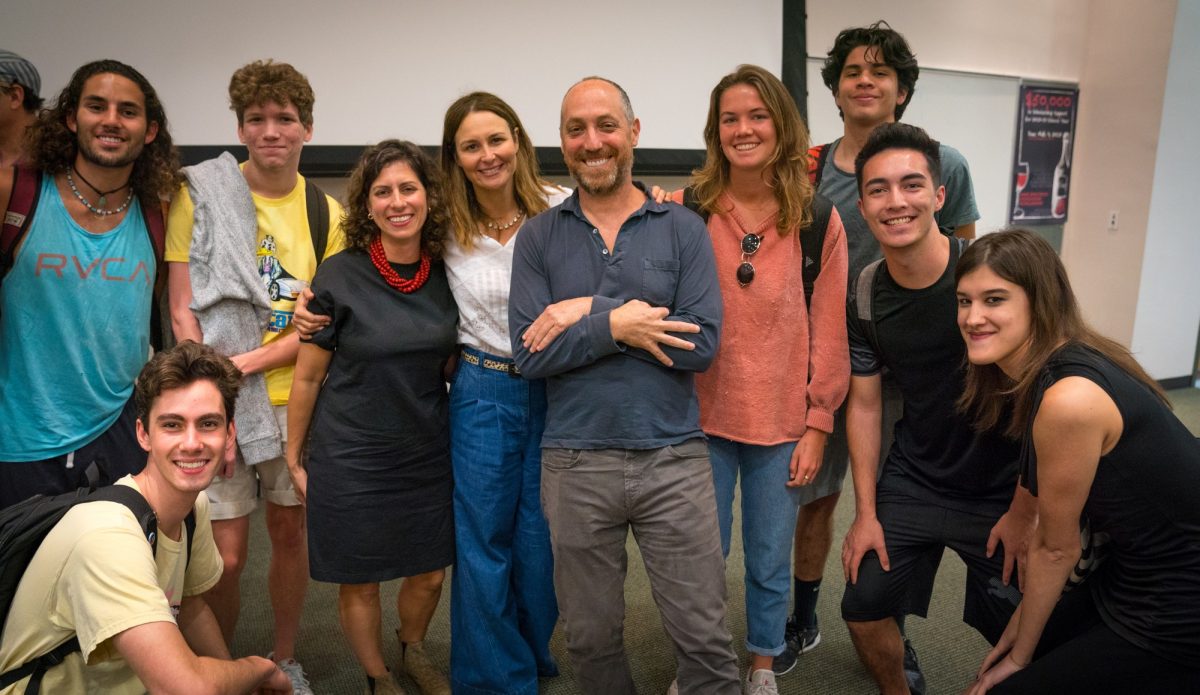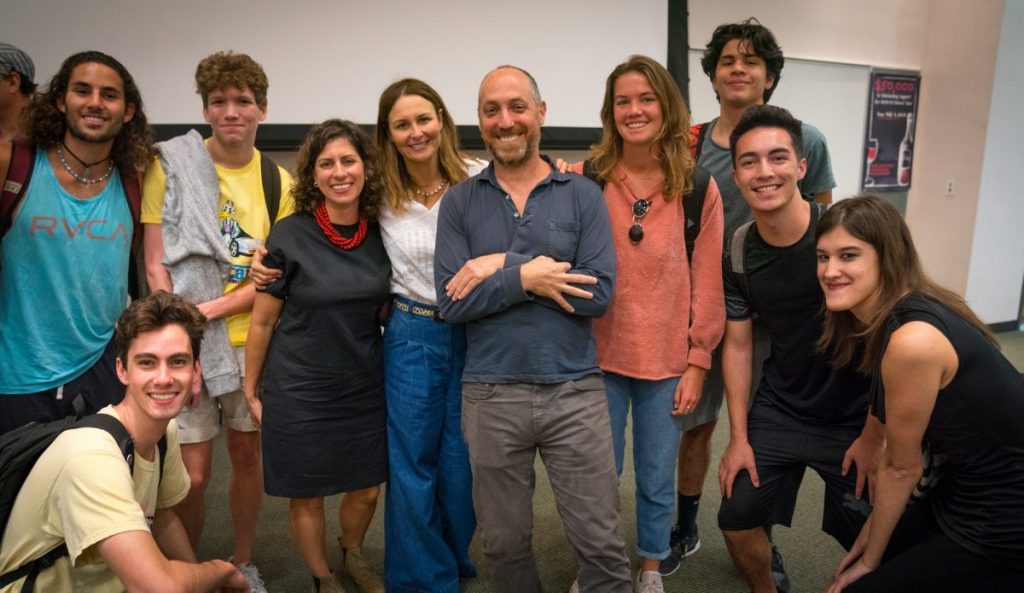

To the average film-goer, the movie experience occurs between the popcorn purchase and the rolling of the credits. Yet, as producers Kevin Chinoy and Francesca Silvestri can attest, the movie production process entails much more than that two-hour window.
Chinoy and Silvestri produced the acclaimed film, “The Florida Project.” They have worked with the film’s director, Sean Baker, on previous projects and have built a partnership producing films with captivating stories. They discussed their experience in film production with a survey of motion pictures (CIM 103) class.
“The Florida Project” follows a struggling single mom and her 6-year-old daughter as the two try to make a living and stay entertained during a summer. They live in a purple, fantasy-themed motel in Kissimmee, Florida, just outside of Disney World, and always seem in danger of being kicked out.
After its premiere at the 2017 Cannes Film Festival, “The Florida Project” hit theaters in the United States on Oct. 7. The American Film Institute and National Board of Review both selected the film as one of the year’s top 10. Willem Dafoe, who plays the manager of the motel, was nominated for Best Supporting Actor by the Oscars, Golden Globes and BAFTA Awards.
Silvestri attended the University of Southern California’s School of Cinematic Arts before moving to Italy and working in film production. She began her career as a producer after a friend in Los Angeles asked her to help with a small black and white film they were making.
After studying film in college, Chinoy worked as a business consultant for five years. He then attended business school at The Wharton Business School, and after finishing, he had an opportunity to work on the production end of “Hurricane Streets.” Both producers acknowledged the importance of jumping right into production.
“When I was at USC, if they were doing student films, we would go and just do the jobs,” Silvestri said. “Those opportunities are a great way to see how to make a movie.”
The producing duo, who owns the Freestyle Picture Company based in Miami, dissected the process of producing films, from finding the right material to the actual production process.
“It always starts with the core idea,” Chinoy said. “Sometimes it’s just the scripts.”
Baker had connections in Kissimmee, where “The Florida Project” is based, Chinoy said. This inspired him to create a film based on the lives of people living in motels surrounding Disney World.
“Sean is as much a sociologist as he is a filmmaker,” Chinoy said. “He spent a lot of time in those motels, getting interviews and talking to people.”
After Baker had an idea for the film, Chinoy and Silvestri then worked on what they called the “cast and cash search.” They began researching actors and the cost of filming with those actors. Once the cast was decided, the clock started ticking – they had to hire a crew, find locations and walk through the production process.
“Sometimes it’s about sitting in front of a monitor and making sure the wheels keep turning every day,” Silvestri said.
The producers discussed difficulties with various aspects of the production processes. They recounted a past film with Kirsten Dunst, in which the house they were shooting in caught fire and they continued to film until the police came to the house. In addition, the final scene of “The Florida Project” was secretly shot on an iPhone 6s inside Magic Kingdom to avoid any legal issues with shooting the film professionally inside a Disney park.
Junior Allison Kadampelil, a student in CIM 103, was impressed with the producers’ ability to sneak into the Disney Park to shoot the last scene.
“I liked that I got more insight on the film by hearing them talk about it than just by watching it,” Kadampelil said. “The film itself felt real. There was no background music at all, so you had to focus on the characters.”
She praised the film for touching on difficult topics, such as poverty, drug use, prostitution and loss of custody.
Chinoy and Silvestri also offered advice to aspiring filmmakers and discussed the future of the film industry.
“It used to be that if you had an Adam Sandler or Brad Pitt, you’d have a home run movie, but now it’s not the case,” Chinoy said. “It’s about the filmmaker first. The story has got to be interesting.”
Silvestri suggested that students network and attend local festivals in order to find producers and collaborators to create great work. She said that filmmakers already have the tools they need to make good films.
“You can go out and make a film on your phone and cut it on your computer, so there’s no reason not to go out and make stuff,” Silvestri said. “You go through the same process making a short film that you do making a feature.”
Though production can be intimidating, Silvestri told students to be confident in making decisions.
“Once you take that formal step, you’ve got to be ready,” Silvestri said. “Even if you don’t have everything you need, you decide, ‘Okay, I’m going to go.’”






